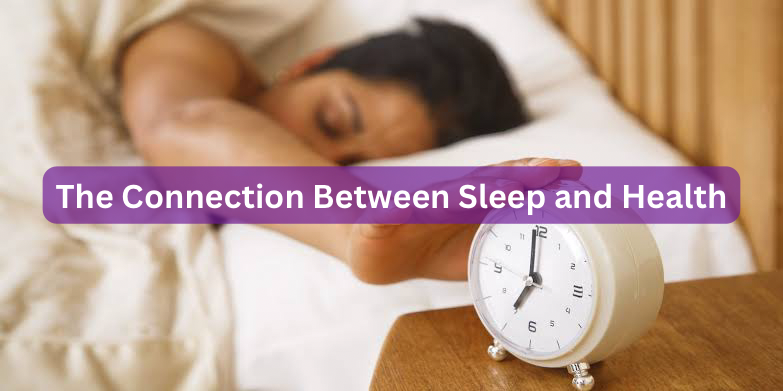The Connection Between Sleep and Health

In our fast-paced and demanding world, sleep often takes a backseat to our daily responsibilities. We may sacrifice a few hours of shut-eye to meet deadlines, socialize, or binge-watch our favorite shows. However, what many fail to realize is that neglecting sleep can have a profound impact on our overall health and well-being. In this blog post, we will explore the crucial connection between sleep and health, shedding light on the importance of a good night’s rest for our physical, mental, and emotional well-being.
1. Physical Health
Adequate sleep is vital for the proper functioning of our body’s systems, including the immune, cardiovascular, and endocrine systems. During sleep, our body repairs and regenerates tissues, strengthens the immune system, and regulates hormones responsible for metabolism and appetite control. Chronic sleep deprivation has been linked to various health issues, such as obesity, diabetes, cardiovascular disease, and a weakened immune system.
2. Mental Health
Sleep plays a crucial role in maintaining optimal mental health. Sufficient sleep allows our brains to process emotions, consolidate memories, and recharge for the next day. Lack of sleep can contribute to mood swings, increased stress levels, anxiety, and even depression. Moreover, sleep deprivation can impair cognitive function, affecting memory, attention, concentration, and decision-making abilities. Getting enough sleep is essential for maintaining a healthy and resilient mind.
3. Emotional Well-being
Sleep and emotions are intricately connected. Sleep deprivation can make us more emotionally reactive. It leads to increased irritability, impulsivity, and a reduced ability to cope with stress. Moreover, a lack of sleep can exacerbate symptoms of mental health disorders, such as anxiety and depression. It may even contribute to the development of certain psychiatric conditions. Prioritizing quality sleep can help regulate emotions, improve emotional stability, and enhance overall emotional well-being.
4. Performance and Productivity
Sleep is the ultimate secret to peak performance and productivity. When one well-rested, our attention span, creativity, problem-solving skills, and overall cognitive function improve significantly. On the contrary, sleep deprivation impairs focus, reaction time, memory recall, and decision-making abilities. This leads to reduced productivity and performance in various aspects of life, including work, academics, and daily tasks. Prioritizing sleep can boost efficiency and ensure that we perform at our best.
5. Weight Management
Sleep plays a significant role in regulating appetite and metabolism. When we are sleep-deprived, our body produces more ghrelin, a hormone that stimulates hunger, while suppressing leptin, a hormone that signals fullness. This imbalance can lead to increased cravings for high-calorie foods and overeating, ultimately contributing to weight gain and obesity.
6. Immune Function
Adequate sleep is essential for a robust immune system. During sleep, the body produces cytokines, proteins that help fight infections and inflammation. Lack of sleep can weaken the immune system, making us more susceptible to illnesses such as the common cold, flu, and even chronic conditions. Prioritizing sleep can enhance immune function and help ward off diseases.
7. Cardiovascular Health
Chronic sleep deprivation has been associated with an increased risk of cardiovascular problems. Insufficient sleep can elevate blood pressure, increase the risk of heart disease, and contribute to the development of conditions like hypertension and stroke. Prioritizing quality sleep can help maintain a healthy heart and reduce the risk of cardiovascular complications.
8. Hormonal Balance
Sleep is closely linked to the regulation of various hormones in our body. Hormones like cortisol (the stress hormone), insulin (regulates blood sugar levels), and growth hormones are influenced by the quality and quantity of our sleep. Disruptions in these hormone levels due to inadequate sleep can lead to imbalances and potentially increase the risk of conditions such as diabetes and hormonal disorders.
9. Longevity
There is evidence suggesting that individuals who consistently get enough quality sleep tend to live longer and have better overall health outcomes. By prioritizing sleep, we can potentially reduce the risk of chronic diseases and age-related health issues, leading to a higher quality of life and increased longevity.
10. Safety
Lack of sleep can have severe consequences for safety, both for ourselves and others. Sleep deprivation impairs motor coordination, reaction time, and judgment, increasing the risk of accidents and injuries, particularly when driving or operating machinery. Prioritizing sleep is crucial for ensuring our own safety and the safety of those around us.
Understanding the profound connection between sleep and health is paramount for maintaining a balanced and healthy lifestyle. From physical well-being to mental health, emotional stability, performance, weight management, immune function, cardiovascular health, hormonal balance, longevity, and safety, sleep plays a crucial role in every aspect of our lives. By recognizing the importance of sleep and making it a priority, we can unlock its incredible benefits, promote optimal health, and enjoy a more vibrant and fulfilling existence. So, let us embrace the power of sleep and make it an essential part of our daily routine.







